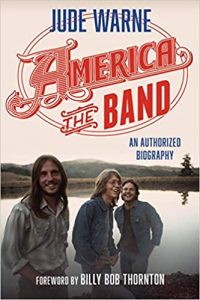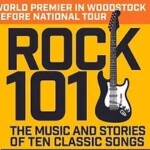Refugees of the turbulent 1960s came out of that wilderness traumatized and weary. The breezy, soft-rock therapy peddled by America had the power to heal and blow away the pollution of cynicism, even if the trio of Gerry Beckley, Dewey Bunnell and the dearly departed Dan Peek was unaware of the medicinal potency their acoustic, folky sounds—so light and lyrical—possessed.
In an easily digestible, in-depth look at the thoughtful artistry and idealistic innocence of one of the most enduring acts of the 1970s, author Jude Warne does more than reassess the band’s underappreciated cultural impact in her richly detailed and absorbing read “America, The Band: An Authorized Biography.” Skillfully and passionately weaving together refreshingly honest, insightful interviews with exhaustive research, Warne demystifies this “logo band,” picking the locks of each complex personality to reveal much about their humanity and integrity, as well as their musical motivations and influences.
Almost overnight, America was a feel-good sensation. Upon leaving high school, they got a record deal with Warner Bros. Records. Their 1971 debut album, America, yielded the worldwide hits “A Horse with No Name” and “I Need You,” with 1972’s Homecoming and its single “Ventura Highway” following suit. Warne contextualizes and frames their meteoric rise in a flowing, chronological narrative, detouring every so often to rummage through the attics of their memories for the origins of America’s songs—the favorites, as well as many deeper cuts—and to follow their delicate, almost fragile development.
Here, the study of the disaster of 1973’s Hat Trick is akin to an autopsy, but the easy studio chemistry America had with Sir George Martin, who produced some of their most beloved Beatles records, on such wildly successfully LPs as 1974’s Holiday and 1975’s Hearts and other records is given a fuller and more thorough review. So is their late-‘70s/early ‘80s commercial swoon and their unexpected revival with Russ Ballard and 1982’s smash “You Can Do Magic.” How they came to humble themselves to pay their dues – however late in the game – with a more demanding touring schedule in recent years, jettisoning the limos and the jet their early success brought them, is more evidence of their admirable principles.
Warne covers a lot of personal ground in the book, digging deeply into the overseas upbringing of all three principal members, products of military families who moved around a lot. Much attention is paid to their different strengths as musicians and songwriters. There’s Bunnell, the naturalist, surrealist and philosopher, and the ever-prolific Beckley, a romantic at heart and a song surgeon specializing in bridges whose curiosity about the creative process and studio magic remains boundless. Those America members enlisted to help them realize their visions are celebrated, too. They get the credit they deserve from Warne.
As for Peek, his battles with rheumatoid arthritis and other health problems are dealt with compassionately, while the rollercoaster love story of Peek and wife Catherine would seem to be the stuff of dramatic romantic fiction, were it not all true. Peek’s departure from America, as well as his religious reawakening and turn towards Contemporary Christian music are also recounted with honesty and candor. In a way, though, it’s heartbreaking to relive Peek’s exit, as necessary as it was for his growth and salvation.
At its core, though, America, The Band: An Authorized Biography is a tale of friendship and good-hearted intentions, of record label intrigue and a naïve belief in themselves. The rock ‘n roll excess they indulged in wasn’t entirely destructive, nor did the music business completely poison their dreams to the point where they died a cruel death. That, in and of itself, is inspiring.
—Peter Lindblad








Be the first to comment!